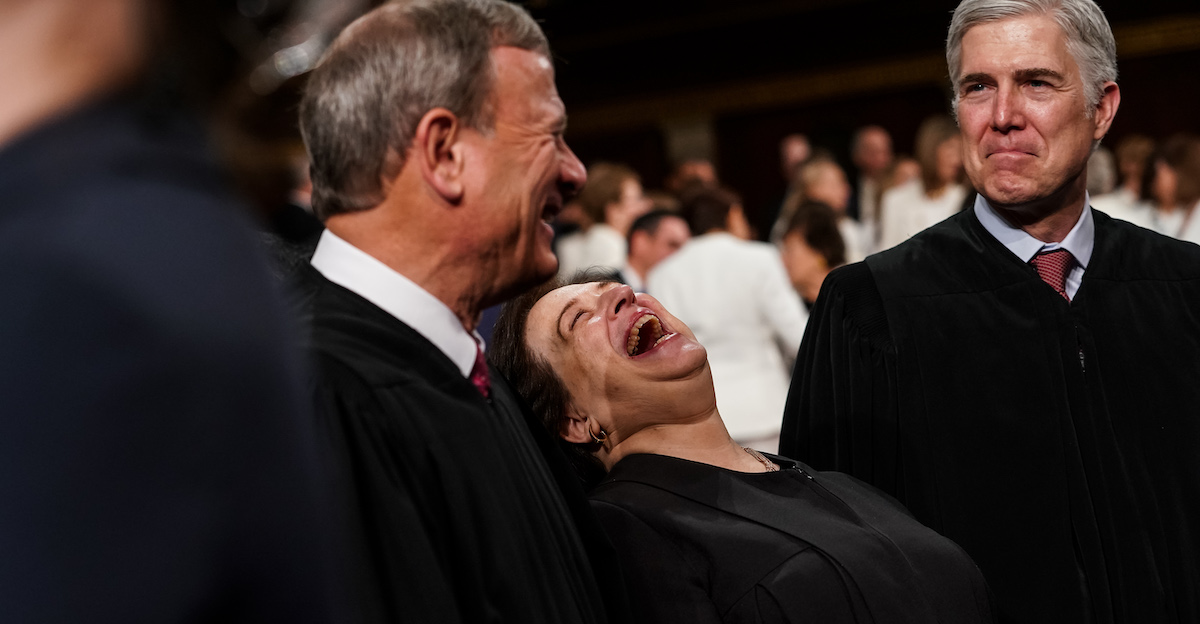
The Supreme Court of the United States signaled its willingness to interfere with California’s affairs on Monday in a case that could provide a boon for well-funded dark money groups in general and conservative nonprofit organizations in particular.
According to Supreme Court blogger Amy Howe, the high court sent word to Solicitor General Noel Francisco to prepare a brief outlining the government’s position on a California state law that requires nonprofits to file certain Internal Revenue Services (IRS) information with state authorities in addition to the federal tax-collecting agency. In turn, California uses the information to maintain a semi-public database of tax-exempt charitable organizations which must be included in the registry in order to business in the state.
The information on the form mandated by the IRS, and requested by California due to the long-standing state law, contains names and addresses of nonprofits’ largest contributors—those who donate $5,000 or more per year.
Two conservative nonprofit groups, Americans for Prosperity Foundation and the Thomas More Law Center, filed lawsuits challenging the California law by arguing that the dual-filing requirement of IRS Form 990 was a violation of their First Amendment right to Free Association because requests for such information could deter megadonors from making such contributions in the first place.
And, while the foundation and law center are the two plaintiffs in the case at hand, the broader conservative movement is cheering them on and supportive of clawing back California’s law.
Here’s how anti-LGBTQI rights organization Focus on the Family describes the issue:
Conservative nonprofit organizations operating there are fearful that the names and addresses of their largest donors will end up in the hands of activists groups on the Left, who will harass those donors and chill future donations.
Golden State authorities, however, adamantly disagree with this interpretation of the law.
California Attorney General Xavier Becerra describes his office’s relationship with IRS Form 990 data in admittedly legalese-adjacent terms on the state’s website.
”State law applicable to charities often relates to matters that are not subject to a specific IRS standard for maintenance of tax-exempt status,” the explanation reads. “And where such federal law does exist, state law may in some cases set a stricter standard.”
The California Charitable Trusts Act is explained in clearer terms in response to litigation in a separate case that was argued back when Sen. Kamala Harris (D-Calif.) defended the same law.
In Center for Competitive Politics v. Harris, California argued the law is “necessary to determine whether a charity is actually engaged in a charitable purpose, or is instead violating California law by engaging in self-dealing, improper loans, or other unfair business practices.”
Legal wrangling in the present case began all the way back in 2001. The foundation began denying California certain IRS info in their annual return and, ten years later, in 2011, then-attorney general Harris finally declared the conservative group in violation of the law.
The foundation and law center filed suit in 2014, challenging the law’s constitutionality and won a quick injunctive victory in a conservative-leaning district court. The injunction was subsequently lifted and the case ping-ponged back-and-forth for awhile.
In early 2018, the Ninth Circuit Court of Appeals reversed the district court’s decision in favor of the plaintiffs using matter of fact language that took the groups to task for essentially overstating their case.
“The Attorney General uses the information solely to prevent charitable fraud, and the information is not to be made public except in very limited circumstances,” the court noted.
The decision goes on to explain:
We hold that the California Attorney General’s Schedule B requirement, which obligates charities to submit the very information they already file each year with the IRS, survives exacting scrutiny as applied to the plaintiffs because it is substantially related to an important state interest in policing charitable fraud.
”Even assuming [for the sake of argument] that the plaintiffs’ contributors would face substantial harassment if Schedule B information became public,” the court went on, “the strength of the state’s interest in collecting Schedule B information reflects the actual burden on First Amendment rights because the information is collected solely for nonpublic use, and the risk of inadvertent public disclosure is slight.”
Since that defeat, the foundation and law center have struggled to keep the issue alive—a petition for a rehearing in the Ninth Circuit was denied early last year.
The Monday instruction from the Roberts court may signal a long-sought victory for conservatives attempting to keep their funding out of the public eye.
[image via Doug Mills/The New York Times POOL PHOTO) NYTSOTU]